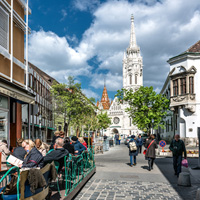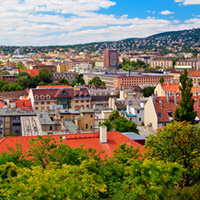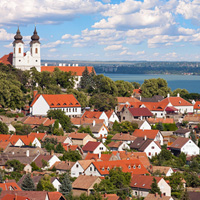Hungary
Hungary is a landlocked country located in Central Europe, bordered by Austria, Slovakia, Ukraine, Romania, Serbia, Croatia, and Slovenia. Its capital and largest city is Budapest, which is often lauded as one of the most beautiful cities in Europe, known for its impressive architecture and rich history. The Danube River, one of Europe's longest rivers, bisects the country and Budapest itself, contributing to the city's picturesque scenery. Hungary has a diverse landscape that includes the Great Hungarian Plain in the east, rolling hills, and the start of the Carpathian Mountains in the north. The country has a rich cultural heritage, with influences from various empires and peoples that have ruled or lived in the region, including the Romans, Magyars, Ottomans, and Austro-Hungarians. Hungarian cuisine is famous for its hearty flavors and is best exemplified by dishes such as goulash and paprikash, with paprika being a signature spice. Hungary is also known for its thermal baths and has more thermal water springs than any other nation. The country's history is marked by significant events such as the Hungarian Revolution of 1956 and its transition from a communist state to a democratic republic in 1989. Today, Hungary is a member of the European Union and NATO, and it has a growing economy with industries ranging from agriculture to technology and manufacturing. Despite its relatively small size, Hungary has made significant contributions to various fields, including science, music, and literature, and it remains a popular destination for tourists seeking to experience its unique culture, history, and natural beauty.
 SJB Global
SJB GlobalConnect
SJB-Global is a top-rated financial advisory firm specializing in expat financial advice worldwide, offering retirement planning & tax-efficient solutions with a regressive fee model. Our clients benefit from their country’s most favorable tax environment by utilizing the efficient investment vehicles we offer. Our commitment to quality service is reflected in our stellar reviews, with over 300 testimonials boasting 95% five-star ratings.
Click connect to have our partner contact you via e-mail and/or phone.
 SJB Global
SJB GlobalSJB-Global is a top-rated financial advisory firm specializing in expat financial advice worldwide, offering retirement planning & tax-efficient solutions with a regressive fee model. Our clients benefit from their country’s most favorable tax environment by utilizing the efficient investment vehicles we offer. Our commitment to quality service is reflected in our stellar reviews, with over 300 testimonials boasting 95% five-star ratings.
Connect
Click connect to have our partner contact you via e-mail and/or phone.
Living in Hungary
Best Places to Live in Hungary
Visa & Residency
Obtaining a residency in Hungary involves several steps and the process can be considered average in terms of difficulty. Expats looking to reside in Hungary typically apply for the National "D" Visa, which is a long-term visa that allows entry into Hungary for the purpose of obtaining a residence permit. The first step is to determine the appropriate type of residence permit based on the purpose of stay, such as employment, family reunification, study, or business activities. Applicants must submit their visa application at a Hungarian consulate or embassy in their home country. The required documents usually include a valid passport, proof of accommodation in Hungary, a round-trip flight reservation, proof of sufficient financial means to support oneself, and a comprehensive health insurance policy. For certain types of permits, additional documents such as a letter of invitation from a Hungarian employer or an acceptance letter from an educational institution may be required. Once the National "D" Visa is granted, it allows the holder to enter Hungary and stay while they apply for the actual residence permit. The application for the residence permit must be submitted within 30 days of arrival in Hungary at the regional directorate of the National Directorate-General for Aliens Policing. The processing time for the residence permit can vary, but it generally takes about 1-2 months. If approved, the residence permit is typically issued for one year and can be renewed. It is important to note that the process may require an in-person interview and additional documentation, depending on the specific circumstances of the applicant. Overall, while the process involves several bureaucratic steps, it is relatively straightforward for those who prepare adequately and meet all the requirements. Expats are advised to start the application process well in advance of their intended move date to allow sufficient time for processing and potential complications.
Healthcare in Hungary
Hungary's healthcare system is a universal model funded by the National health insurance Fund (Országos Egészségbiztosítási Pénztár, OEP). All Hungarian citizens and residents, including expatriates who are registered and contribute to the social security system, have access to healthcare services. The system provides a range of services from primary care to specialized treatments. Public healthcare facilities are widespread, but they may suffer from underfunding and long waiting times. Private healthcare is also available and offers faster and more comfortable services, albeit at a higher cost. Expats and digital nomads can access public healthcare once they have a residence permit and are registered with the OEP. They must also contribute to the social security system to be eligible for full healthcare services. Private insurance is often recommended for those seeking immediate and high-standard care.
Cost of Living
The cost of living in Hungary is generally considered moderate when compared to other European countries. Essentials such as food, public transportation, and housing are reasonably priced, making it an affordable destination for expatriates and tourists alike.
Weather
Hungary experiences a continental climate, with hot summers and cold, snowy winters. Spring and autumn are generally mild, but conditions can be unpredictable. Precipitation is fairly evenly distributed throughout the year, with occasional heavy showers in the warmer months.
Educational System in Hungary
The educational system in Hungary is comprehensive and follows the Bologna Process, which standardizes education across Europe. Education is mandatory from the age of 6 to 16. The system is divided into four main stages: kindergarten (ages 3-6), primary school (grades 1-8), secondary school (grades 9-12), and higher education. Primary education typically starts at age 6 and lasts for 8 years, where students receive a broad education. Secondary education is either general or vocational, with general high schools preparing students for higher education and vocational schools focusing on practical skills for various trades. After completing grade 12, students take a matriculation exam (Matura), which is necessary for university entrance. The Hungarian education system is known for its strong emphasis on the sciences and mathematics, and it has produced several notable Nobel laureates and innovators throughout history. Schools in Hungary also offer language education, with English and German being the most popular choices. For families moving to Hungary, there are also international schools that offer education in English and follow international curricula.
Universities in Hungary
The university system in Hungary is part of the European Higher Education Area and offers Bachelor's, Master's, and Doctoral degrees. Bachelor's programs typically take three to four years to complete, while Master's programs take one to two years. Doctoral programs can take an additional three to four years. Hungary has a mix of public and private universities, with the former being more prevalent. The academic year usually starts in September and is divided into two semesters. Hungary is known for its strong programs in medicine, engineering, and the sciences, but it also offers a wide range of other disciplines. Foreign students considering attending university in Hungary will find a welcoming environment with a growing international community. Many programs, especially at the Master's and Doctoral levels, are offered in English to accommodate international students. The cost of living in Hungary is relatively low compared to other European countries, which can make studying there more affordable. Additionally, there are scholarships and grants available for international students, such as the Stipendium Hungaricum scholarship program.
Copyright 1997-2025 Burlingame Interactive, Inc.














